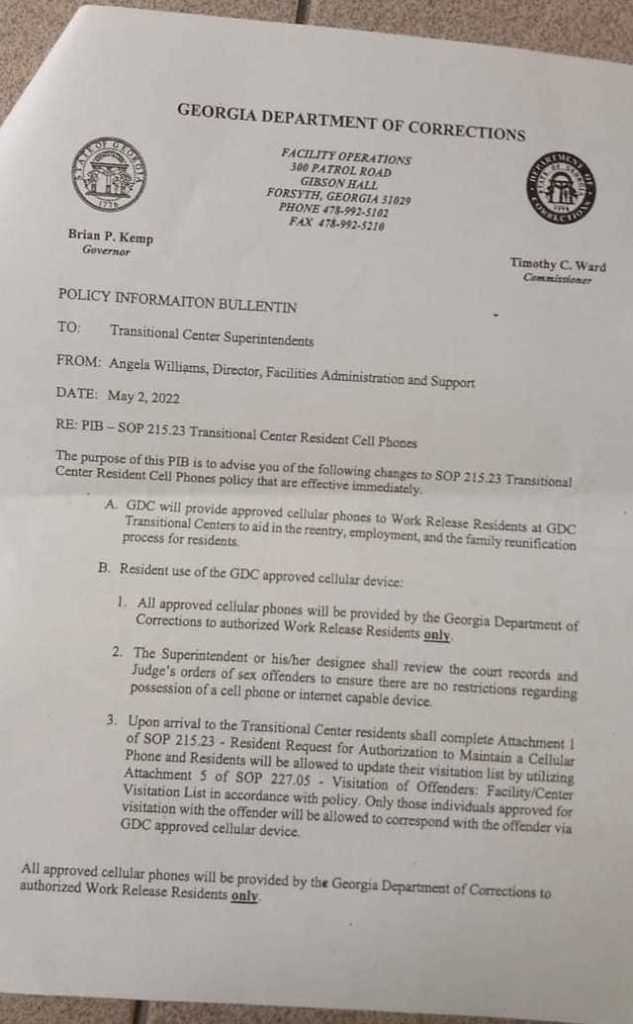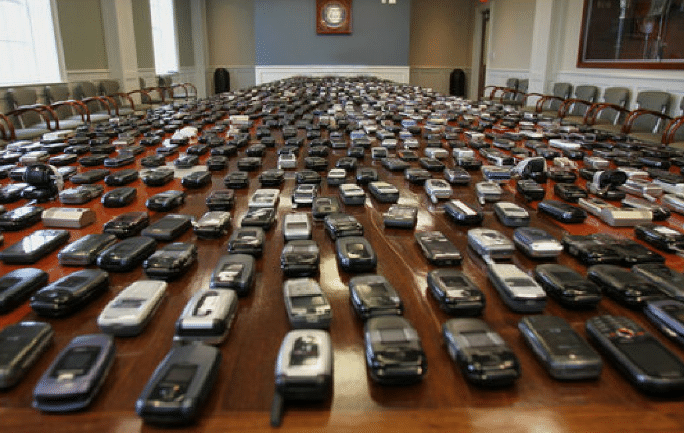The Georgia Department of Corrections (GDC) is no longer allowing prisoners on work release to acquire their own cell phones. It’s replacing them with GDC-issued phones that prisoners do not feel will adequately permit them to make vital re-entry preparations, like securing housing.
On May 2, GDC’s director of facilities administration and support sent a memo to all Transitional Center (TC) superintendents advising them of the change, effective immediately. Twelve TC facilities across Georgia have beds for more than 2,300 prisoners, who can be transferred there near the end of their sentence to live in partial confinement and gradually readjust to the free world.
For most people incarcerated by GDC, cell phones are considered contraband, and being caught with one is punished with additional criminal charges. However, prior to May 2, eligible TC prisoners were allowed to receive pre-paid cell phones from people on their approved visitor list. Though they had to meet certain specifications, these were free-world phones that allowed prisoners to use the internet, including social media networks and cash apps. Now, TC residents will only be allowed to acquire phones provided by GDC, which do not allow them to call or text anyone not on their approved visitation list (capped at seven people).
“I don’t know how I’m supposed to find work, clothes, an apartment later on? I’m very down about this.”
Prisoners have also received no clarification on whether they will have to pay GDC for these phones or their service fees. The memo states only that GDC will “provide” the phones, creating an atmosphere of deep uncertainty. Even unverified assurances that the phones are being issued at no cost have only made many prisoners that much more convinced GDC is profiting, having not known the department to be in the habit of giving things away for free. GDC did not return Filter‘s requests for comment.

Filter was not able to speak with anyone who had already received a GDC-issued phone, nor verify the phones’ capabilities independently. However, multiple prisoners across several GDC facilities, including TCs, report being told the new phones have no social media access, with several being told they’re flip phones with no internet access at all. The change is particularly worrisome to people with sex offense convictions—who, in addition to being singled out in the memo, rely on free-world phones to make reentry preparations that abide by sex offender registry restrictions.
Prisoners participating in work release at a TC have the difficult task of making their reentry preparations on their own.
“Having just read the memo, I’m very depressed at the prospects of my release next year,” Richard, a 32-year-old TC hopeful in Phillips State Prison nearing the end of a 10-year sentence for a sex offense, told Filter. “Since mother died, [social media] is all I’ve had for support mentally and financially. I don’t know how I’m supposed to use a phone that only allows me to call the prison to network with my social media base to find work, clothes, an apartment later on? I’m very down about this.”
Prisoners participating in work release at a TC have the difficult task of making their reentry preparations on their own, trying to set themselves up to rebuild their lives and make a future with some semblance of success and happiness inside the lines of lawful conduct.
Despite the memo stating that the new phones will aid TC residents in the “reentry, employment and the family reunification process,” this effectively prevents them doing those things. Indeed, for the elderly, for those from outside the state of Georgia, for those who are disabled, for those who need support for substance use, this change stands to increase the odds of technical parole violations and recidivation, as well as homelessness, overdose and suicide.
Richard is worried about his sobriety. “The alternative is I fail the TC, or fail the probation?” he asked. He’s required to complete certain sex offender programs while in TC; if he doesn’t do so successfully, he’ll have to wait until his sentence maxes out, and will still not even be able to use that time to make preparations for release.
“Maybe I’ll just be better off dead,” he said. “For real, to get this close to the end with a plan in mind, only to have it ripped away.”
Photograph of contraband phones via Georgia Department of Corrections




